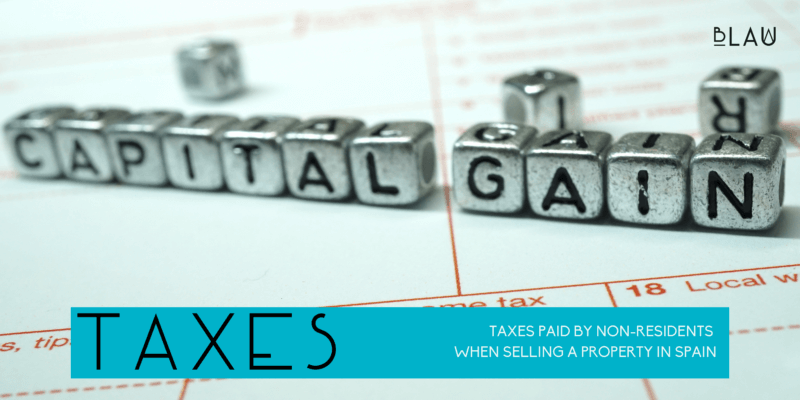It is very common, especially in the Costa Blanca area, for expats to purchase a home to spend their holidays on sunny beaches. This phenomenon is known as “RESIDENTIAL TOURISM” and it is one of our main areas of specialization in our multilingual law firm.
WHAT TAXES MUST A NON-RESIDENT PAY WHEN SELLING A HOME IN SPAIN?
Due to its complexity and the doubts it raises, we have decided to start these series of blog articles by analyzing the taxes that non-resident in Spain must pay when selling their home on the Costa Blanca.
Take out your notebook, your paperwork and your excel sheet…and lets start calculating:
There ARE TWO MAIN TAXES THAT MUST BE PAID and, today, both are accrued only in the event that there is a positive income derived from the transfer of the home in Spain.
- PLUSVALÍA also called: CAPITAL GAINS ON URBAN LAND (IIVTNU):
It is a municipal tax levied on the increase in value of urban land, this tax has undergone many changes in recent years. In most of the Town Halls of the Costa Blanca this Tax is managed by SUMA, just like the IBI.
Here are some links of interest:
Calculation: Click here / Tax operation: Click here / If your municipality is not included in the SUMA list, you can try to calculate through the following link (*If it appears in Spanish you can change the language)
- NON-RESIDENT TAX, in its modality, CAPITAL GAINS ARISING FROM THE SALE OF REAL ESTATE.
It is a State tax that is levied on 19% of the PROFIT obtained from the sale of the home.
Where the PROFIT is = (selling price – selling costs & taxes) – (Buying price + buying costs & taxes)
All the information about this Tax: here (*If it appears in Spanish you can change the language)
- THE RETENTIONS AND WITHHOLDINGS
In the case of Non-Residents, the operation of Withholdings is especially important. Given that taxes are not paid at the same time the home is sold, Spanish Law tries to prevent foreigners from leaving Spain without paying their taxestherefore special mechanisms are established in both cases.
Plusvalía: Although the taxpayer will be the seller, the person responsible for the tax will be the buyer, in this way it is usual for the buyer to withhold the amount of this tax from the price to be paid in the sale.
Withholding of 3%: In the case of the Non-Resident Tax, the mechanism is a little more complex, in this case, the buyer must withhold from the price and pay into the public treasury 3% of the total selling price.
Subsequently, it will be the seller who must update their tax situation with the Spanish Treasury, so that:
If 19% of the profit is < 3% of the total selling price= Request to return the difference to the seller
If 19% of the profit is > 3% of the total selling price = Payment of the difference by the seller;
We hope that this article has helped you to estimate the costs of selling your home in Spain.
If you need a personalized calculation or a more detailed explanation of the terms and tax models to be used, do not hesitate to contact Blau Abogados.







Leave A Comment